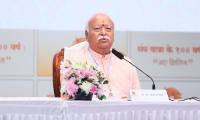A day before the Supreme Court is scheduled to hear bail pleas of Godhra carnage accused, a petitioner on Tuesday moved court seeking an inquiry by a high court judge into the alleged role of Gujarat Chief Minister Narendra Modi in the incident and the riots in 2002.
The petition filed by an Ahmedabad-based non-governmental organisation, Namrata Khadi Gramdhyog Trust, said there was need for constituting a commission of inquiry headed by a sitting judge of the high court, as neither the Centre nor the state government has taken appropriate action.
The NGO said a proper inquiry was necessary as no follow-up action was taken by the Centre to bring the culprits to book on the basis of the findings of the Justice U C Banerjee commission report which was accepted by Parliament.
The NGO also sought a probe into the alleged role of other leaders, bureaucrats and organisations like the Vishwa Hindu Parishad, Rashtriya Swayamsevak Sangh, and others in the riots.
Meanwhile, the apex court is scheduled to hear on Wednesday the bail plea of some of the accused of the Godhra carnage.
Mohammad Hussain Abdulrahim Kalota, one of the main accused, and seven others in the Godhra carnage case, have approached the Supreme Court for bail.
The accused, who have been in jail for five years, have filed bail applications on the ground that the Central POTA Review Committee had held that no case was made out against them under the anti-terror law.
The accused have approached the court following an order by a bench headed by Justice B P Singh on February 22, which had granted liberty to around 90 accused in the Godhra carnage to apply for bail after it was informed about the decision of the POTA Review Committee.
The apex court had earlier stayed the trial of the case.
The accused have sought bail contending that since the Review Committee has given its finding that they cannot be prosecuted under POTA, they were entitled to be released.
The court had also decided to examine the constitutional validity of a POTA provision that binds courts to abide by the Review Committee's findings on the applicability of the anti-terror law, which has been repealed.
The Court had said the validity of sub section (3) of section 2 of POTA by which amendment was brought in section 60 of the act, would be examined by the larger Bench.
The amendment makes it mandatory that the findings of the Review Committee will be binding on the courts whether it had taken cognizance of the offence or not pending before it.
The Gujarat government had claimed that the act which was repealed has given unbridled power to the Review Committee.
It had referred to the observations of the Gujarat high court which had said that the purpose of enacting the repealed act with added power to Review Committee was politically motivated and decisions taken by it were administrative in nature and could not do away with the working of the judicial system.








